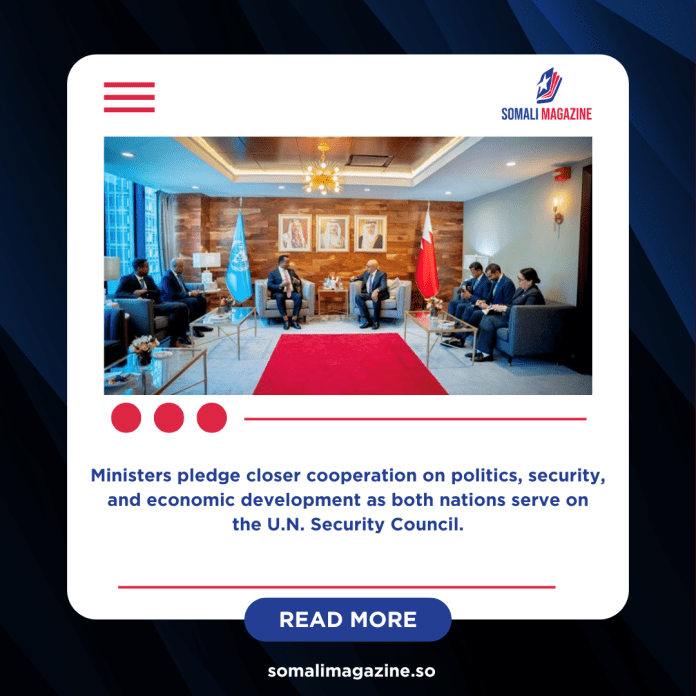Facebook Twitter (X) Instagram Somali Magazine - People's Magazine
Bahrain’s Foreign Minister, Dr. Abdullatif bin Rashid Al Zayani, met with Somali Foreign Minister Abdisalam Abdi Ali on Tuesday during the 80th session of the United Nations General Assembly in New York. The meeting, held at Bahrain’s Permanent Mission to the U.N., focused on ways to strengthen the relationship between the two countries and explore areas of cooperation that could benefit both sides.
The discussion came at an important moment, as both Bahrain and Somalia currently serve as nonpermanent members of the United Nations Security Council. This shared position provides them with a unique opportunity to coordinate on international issues and ensure that their voices, and those of their regions, are heard in global decision-making. Both ministers acknowledged the importance of working together closely in this role.
Dr. Al Zayani began by congratulating Minister Abdisalam on his recent appointment as Somalia’s top diplomat. He wished him success in his new responsibilities and praised the fresh opportunities that this change in leadership could bring for Somali-Bahraini relations. He reaffirmed Bahrain’s strong commitment to advancing ties with Somalia, emphasizing that cooperation between the two nations could grow stronger and more meaningful across different fields.
The Bahraini minister explained that Bahrain is keen on building a deeper partnership with Somalia, especially in areas that directly serve the interests of both countries. Political coordination was highlighted as one of the main areas where their collaboration could make a difference. By sharing perspectives and aligning their positions on key issues at the U.N., the two nations could maximize their influence in discussions that affect peace, security, and development around the world.
Economic cooperation also stood out as a central theme in the talks. Both Bahrain and Somalia see opportunities for growth through trade, investment, and joint projects that can bring tangible benefits to their citizens. Somalia, with its young population and strategic location in the Horn of Africa, presents potential for investment and partnerships that can drive development. Bahrain, on the other hand, brings experience in finance, trade, and regional diplomacy that could support Somalia’s efforts to expand its economic opportunities.
Security was another major issue discussed during the meeting. The two ministers recognized the importance of building strong partnerships to address challenges that affect regional stability, including terrorism, piracy, and organized crime. Strengthening security cooperation not only supports the protection of both nations but also contributes to peace and stability across the wider region.
Throughout the talks, Dr. Al Zayani emphasized that Bahrain values its relationship with Somalia and is determined to work on expanding cooperation at both the bilateral and multilateral levels. He noted that their shared membership on the U.N. Security Council provides an excellent foundation for deepening coordination, and he stressed the importance of supporting each other’s priorities in international forums.
Minister Abdisalam welcomed Bahrain’s interest in enhancing the partnership and expressed his country’s readiness to work closely with Bahrain in the months ahead. The two leaders agreed that their meeting was just the beginning of a process aimed at building a stronger and more strategic relationship that could open new doors for both nations.
The talks were attended by senior Bahraini diplomats, including Ambassador Jamal Faris Al Ruwaie, Bahrain’s permanent representative to the United Nations, and Ambassador Shaikh Abdullah bin Ali Al Khalifa, director general of bilateral relations at the Foreign Ministry. Their participation highlighted the importance Bahrain places on its relationship with Somalia and the seriousness with which it approaches discussions about future cooperation.
The meeting between Bahrain and Somalia’s foreign ministers reflects a growing trend of collaboration between countries from the Gulf and Africa. As both nations look ahead, their willingness to strengthen ties across politics, economics, and security signals a new chapter in their bilateral relationship, one shaped by shared goals, mutual respect, and a commitment to making a positive contribution to regional and international affairs.

